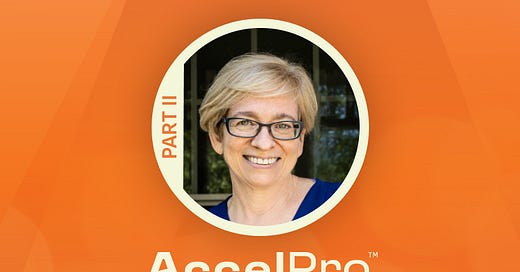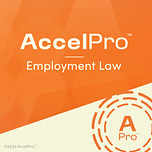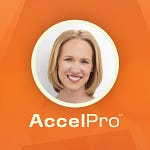We hope you’re finding value in our weekly expert interviews and series of events. Your engagement and feedback shape the topics we cover and the career products we offer. Sign up now, and your annual membership will include a free trial and a discount of more than 40%.
Welcome to AccelPro Employment Law, where we provide expert interviews and coaching to accelerate your professional development. Today, we are featuring a discussion with Chai Feldblum about professional development, the value of peer-to-peer relationships and how to develop your writing voice.
Feldblum served as a professor at Georgetown for 18 years, a Commissioner at the Equal Employment Opportunity Commission (EEOC) for 10 years and is now Vice Chairperson of the AbilityOne Commission and a workplace consultant.
“Even when everything seems fine, I still think in terms of having a fun life and career, it’s worth thinking about change,” she says.
This is the second of two episodes with Feldblum. The first covered her career-spanning work with the Americans with Disabilities Act (ADA) and LGBTQ+ issues.
Listen on Apple Podcasts, Spotify and YouTube.
Interview References:
Chai Feldblum’s profile.
3:11 | Employment Non-Discrimination Act, S.815 (2013).
3:34 | The Americans with Disabilities Act Amendments Act of 2008, PL 110-325 (S 3406), 42 USCA § 12101 note (2008). US Equal Employment Opportunity Commission.
4:29 | The Rehabilitation Act of 1973, Section 501. US Equal Employment Opportunity Commission.
Supplemental Materials:
Legislative Lawyering. Chai Feldblum.
Feldblum, Chai. Workplace Flexibility 2010: Reflections on Working With Corporations. NYU. Review of Law & Social Change, Vol. 36.
TRANSCRIPT
I. DON’T BE AFRAID TO TAKE RISKS
Matt Crossman, Host: Let’s talk about your time on the EEOC as it relates to professional development. What did you learn in those 10 years you spent on the commission that HR executives and employment attorneys would want to know?
Chai Feldblum: Well, I would say No. 1, for professional development — and this is true for any point in your career — don’t be afraid to take risks, don’t be afraid to change. It’s particularly hard to change when you don’t have to. Even when everything seems fine, I still think in terms of having a fun life and career, it’s worth thinking about change.
So I’d been a law professor at Georgetown Law School for 18 years. I had gone there after I’d finished working on the ADA. I very much wanted to develop the concept and teach the skills of what I called legislative lawyering. It was a combination of loving law, loving reading cases and also loving politics and negotiations.
And so that was the legislative lawyer concept, and that’s what I taught students. And I took on clients that I felt were advancing social-justice goals, like Catholic Charities USA, and various disability rights clients.
I’d also just started the Workplace Flexibility 2010 project, bringing together employers and employee groups to think about increasing workplace flexibility rules in the employment setting. And the Employment Non-Discrimination Act was pending in Congress. It looked at that point — 2008 — that maybe that would pass.
And so when I got a call sort of out of the blue from the White House, asking if I wanted to be an EEOC commissioner, I thought, if ENDA passes, we’ll have to issue regulations, and it would be nice to be at the EEOC for that. And I had just finished a year or so before working on the ADA Amendments Act of 2008, which restored a broad definition of disability.
And again, I thought, that would be interesting to be on the EEOC for that. So that was the reason I went to the EEOC. And in fact I was able to do a few things.
No. 1, making sure that there were bipartisan regulations that were issued to implement the ADA Amendments Act. I thought that was very important. I worked very closely with my Republican colleague, Commissioner Vicki Lipnic, and I think we got regulations out that were easy to understand and did not go beyond the intent of the law.
We also then worked on issuing regulations for the first time under Section 501 of the Rehabilitation Act, which applies to the federal agencies and actually sets aspirational targets for hiring people with disabilities all the way through the agency levels.
And although Section 501 does not apply to private employers, I think it’s useful to read those regulations and see those aspirational goals because legally there’s no problem having preferential hiring of people with disabilities. And then on the LGBT side, ENDA never passed, so there weren’t regulations, but we ended up getting the same result because in the federal sector, the agency could issue opinions.
Cultural logic had caught up with legal logic in terms of the commissioners. And we were able to issue opinions that said sexual orientation and gender identity were forms of sex discrimination. And that paved the way for the Bostock Supreme Court decision.
I will say one last thing on professional development, I was planning to just spend three years at the EEOC because that actually was my term. It’s a five-year term, but I was taking over someone else’s seat. I would have been able to still keep my tenure if I went back to Georgetown after three years. But the agency had only issued the opinion saying gender identity was a form of sex discrimination, and not yet that sexual orientation was a form of sex discrimination.
And I just felt it was important to stay at the agency to see if that case could come up. So I gave up my tenure, stayed at EEOC, was totally thrilled with doing that, and then went on to other things.
—
II. HOW TO CREATE A CULTURE THAT PREVENTS WHAT THE LAW PROHIBITS
MC: I’m going to read a sentence from your bio. “I’ve been a drafter of bills, a teacher of students, an author of scholarly articles, an implementer of civil rights laws, and a helpmate in creating safe and respectful workplaces.”
Helpmate is the word I want to ask you about. The question is often, frankly, how little can a company do to be in compliance? For that HR director or employment attorney out there who wants to forge not just the absence of discrimination, but the presence of respect, what can they do?
CF: So, back to how we started, right? There’s law, policies and practice, and social norms. So you can just do, as you say, the absolute minimum that the law requires. But if you believe in the social-justice goal, you really do want to think about what can you do, for example, to prevent what the law prohibits before it even happens, to create a culture in which the principles, the values of that non-discrimination law, whether it’s on pay or anti-harassment or anything else, are truly absorbed in your company.
In my last few years at the EEOC I was working again with my fellow commissioner, Vicki Lipnic, on how to help employers create a culture in which harassment, for example, didn’t happen in the first place, or discrimination didn’t happen in the first place, because the employer had created a safe and respectful workplace.
And doing that is in fact what made me then go work for two years at Morgan Lewis, a major management law firm, because I wanted to get in there helping employers from the ground up. So I would say to every HR person, you know this is part of your job, so keep saying it: I want to help create a safe and respectful workplace. I want respectful workplace training to be offered in my workplace, not just anti-harassment training.
For the general counsels, for the employment lawyers, yes, obviously keep your employers safe, but then reach out to HR and say, “what can we do together to help change this culture?” Because it will help you legally down the line. And it’ll help you right now in terms of having a more productive workplace. So why wouldn’t you want that?
MC: You mentioned Vicki Lipnic a couple of times, and I wonder if she might be the answer to the question that I’m about to ask you. How have peer-to-peer relationships and mentoring been important in your career?
CF: Oh, I love that question because mentoring is, to me, so important. It’s been a huge part of my life. Partly, officially, right? As a law professor, you’re mentoring your students, but even beyond that, I would stay in touch with research assistants, et cetera. And then even when I stopped teaching, mentoring was incredibly important.
So that’s not peer to peer, right? That’s mentoring folks who are coming up in their careers. And I literally just told this to a young woman two days ago. I said, “You want to think about a job where you can find a mentor.”
And the way you do this is not going to people and saying, “will you be my mentor?” It’s about being interested in what they’re doing, coming forward with questions.
So again, I hope everyone listening to this, if you’re further along in your career, think to yourself, am I mentoring anyone? Because you should be. And if you’re younger, try to see, can I find someone who’s interested in mentoring me? So that’s the mentorship.
On peer-to-peer relationships, the important thing is respecting and understanding that you don’t know everything.
I brought a very employee-focused perspective to the EEOC, although always being very respectful of employer concerns. That’s why I was able to negotiate bills all those years, by realizing I don’t know everything. Vicki Lipnic, who had a different background and experience, could teach me things just like I could teach her things.
Of course, you have to be open to learning, and both of us were, and both of us benefited from it.
—
III. GOOD WRITING SHOULD FLOW
MC: Your writing voice is utterly charming. For a young attorney out there who wants to become a better writer, how did you do it?
CF: So writing is, of course, essential. Communication is essential. First, you have to, as you’re dealing with an issue, identify the issue correctly. What is it that you’re writing about? What is it that you want to convey?
So you have to articulate for yourself the issue. You have to do the appropriate research, and then you have to communicate it. The first thing you need to think about is who is my audience?
A lot of what I taught in my legislation clinic was how to write the one pager after you had done your two weeks of legal research and how to write it in a way that people who are not lawyers could understand it.
And then my second piece of advice is this: the reader shall do no work. Do not have any piece of writing where the reader has to read the sentence twice and maybe add the word that’s missing. The reader shall do no work. So just read over what you’ve written.
And by the way, to the extent you can make it interesting that will help the reader as well.
MC: How did you practice that?
CF: I want to talk first about cultural advantage. So often you have folks who have great potential, but if they’ve grown up in a situation where they’re lower income, largely because of other forms of discrimination, or their parents are working three jobs just to keep things going, they’re not going to have the same opportunities as someone who has had parents who have been able to invest in them significantly.
So the reason I say this in response to your question is the minute you asked me about writing, I thought about my mother. She grew up as the daughter of a very Hasidic rebbe. My whole family was very Orthodox. Her cohort, her friends, never went to college.
And my father encouraged her to go to college and then graduate school. She got her PhD at Columbia. I remember, starting from third grade, every time I would write something, I would go to her and she would help me edit it. What a gift that was, that I had someone at such a young age helping me.
Think again about mentoring. Can you go to some elementary school, high school, give that to someone? And you know what? If you start doing it for someone else you might get better yourself. So I feel that was a blessing in my life.
And I’ve always just loved words, loved text. We had a contest once in the clinic to come up with a tagline for the clinic, and the students came up with “changing the world one word at a time,” because of course, words matter, especially if you’re drafting laws and regulations.
MC: What is the biggest challenge you have overcome or are overcoming?
CF: In terms of continuing to overcome, absolutely having anxiety disorder, even medicated and treated, is part of my life now. It’s not the anxiety disorder of speaking in front of people. I can talk to a thousand people and it doesn’t phase me at all.
But if I feel I’ve done something wrong, or I hurt someone’s feelings and I shouldn’t have, I can just start to spiral. Now I know how to deal with it, or there’s medication. But every time I think maybe I don’t have anxiety disorder, then I have some episode and I’m like, “Oh yes, Chai, you do.”
There’s a reason to be open about this: to de-stigmatize it—it shows you can be very successful even if it’s something you’re constantly overcoming.
MC: The examples that you used to describe what might trigger an anxiety attack sound very much like the examples that your work is hoping to put an end to. That can’t be a coincidence.
CF: Oh, that’s interesting. So, for me, what can trigger the anxiety attack for me is feeling like I made a mistake, right? Or that I hurt someone’s feelings.
The respectful workplaces training I do is about saying how important respect is in a workplace. Respect is reflected in, one, people feeling like they can speak up and be listened to, and two, people feeling like they can make a mistake and instead of being slammed or yelled at, the supervisor will say, “OK, that was a mistake. What can we learn from that?”
And by the way, I have never thought about that connection before. So my feeling is that in every new situation, whether I’m speaking on a panel or talking on a podcast, one can always learn something new.
NOTE: Listen to Part I of the AccelPro conversation with Chai Feldblum.
Listen on Apple Podcasts, Spotify and YouTube.
This AccelPro audio transcript has been edited and organized for clarity. This interview was recorded on August 14, 2023.
AccelPro’s expert interviews and coaching accelerate your professional development. Our mission is to improve your day-to-day job performance and make your career goals achievable.
Send your comments and career questions to questions@joinaccelpro.com. You can also call us at 614-642-2235.
If your colleagues in any sector of the employment law field might be interested, please let them know about AccelPro. As our community grows, it grows more useful for its members.












